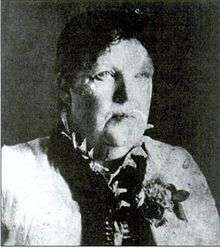Elizabeth Potts
| Elizabeth Potts | |
|---|---|
 | |
| Born |
Elizabeth Atherton December 21, 1846 Manchester, England |
| Died |
June 20, 1890 (aged 43) Elko, Nevada, US |
| Occupation | Housewife |
| Known for | Convicted of murder; only woman legally executed in Nevada. |
Elizabeth Potts (née Atherton; December 21, 1846 – June 20, 1890) was convicted of murder in 1889 and hanged the following year, the only woman ever to be legally executed in the U.S. state of Nevada. Her husband, Josiah Potts, was executed simultaneously, having also been convicted of the murder and partial dismemberment of Miles Faucett.
Biography
Elizabeth Atherton and Josiah Potts (1842–1890) were both born in Manchester, England. They married in 1863 and immigrated to the United States two years later, settling in Milwaukee, Wisconsin. They became parents to at least five and as many as seven children (sources differ on the number), including a son named Charley (age 17 in 1890), a daughter who was 13 in 1890, and a daughter named Edith (born July 4, 1883).[1][2] The family moved west after Josiah, a machinist, got a job with the Central Pacific Railroad, at first in Terrace, Utah, and in 1886 in Carlin, Nevada. While living in Carlin, Elizabeth temporarily separated from Josiah, possibly due to financial hardships. While separated from her husband, Elizabeth traveled to Fresno, California, where she entered into a bigamous marriage with Miles Faucett, a carpenter who was also a native of England. The story of the marriage was not revealed publicly until it was uncovered by a San Francisco journalist some time after the Pottses had been executed for Faucett's murder.[3]
As of 1887, Elizabeth had returned to her home in Carlin. Faucett also went to Carlin, where he took up residence as a boarder in the Potts household. He soon bought a nearby ranch and moved to his property, but visited the Potts home regularly because Elizabeth provided him with bread and washed his laundry.[2][3]
Disappearance and death of Miles Faucett
On January 1, 1888, Faucett told a friend, J.P. Linebarger, that he intended to visit the Pottses to collect some money they owed him, and that he had knowledge about Elizabeth's past that he could use to convince her to pay the debt. Faucett and Linebarger arrived together at the Potts' home, whereupon Elizabeth invited Faucett to spend the night. Faucett accepted, Linebarger departed, and Faucett was not seen alive again.[2] In the days thereafter, when questioned about Faucett's disappearance, Josiah Potts said that Faucett had been called away on business in another state.[2][3]
In the summer of 1888, the Pottses moved to Rock Springs, Wyoming, and their house in Carlin was rented to a family named Brewer. In January 1889, George Brewer discovered mutilated human remains in the home's cellar. The remains were identified as those of Miles Faucett, and Elizabeth and Josiah Potts were arrested for the murder.[2][4]
Murder conviction and execution
The Pottses were indicted for murder in the first degree and tried.[2] They were both convicted of murder and sentenced to the death penalty. A double gallows, manufactured in Placerville, California, was obtained for the hanging and invitations were issued for attendance at the June 20, 1890 event.[1][3] Elizabeth and Josiah Potts were hanged simultaneously before an audience of 52 men. Their bodies were buried in Elko Cemetery and later reinterred in a common grave when the cemetery was relocated.[4]
Elizabeth is the only woman ever to be legally executed in the history of Nevada.[3][4] The Potts hanging was the last legal execution in Elko County;[4] a state law passed in 1901 ended the practice of conducting executions in Nevada's county seats.[5]
References
- This article includes text incorporated from Church of Jesus Christ of Latter-Day Saints' "The Deseret Weekly" (1890), a publication now in the public domain.
- 1 2 Wilson, R. Michael (June 1, 2007). Frontier Justice in the Wild West: Bungled, Bizarre, and Fascinating Executions. Globe Pequot. pp. 87–. ISBN 978-0-7627-4389-6. Retrieved 24 May 2012.
- 1 2 3 4 5 6 Church of Jesus Christ of Latter-Day Saints (June 28, 1890). "Miles Fawcett". The Deseret Weekly. 41 (Public domain ed.). Deseret News Co. p. 17. Retrieved 24 May 2012.
- 1 2 3 4 5 Rutter, Michael (1 June 2008). Bedside Book of Bad Girls: Outlaw Women of the Old West. Farcountry Press. pp. 50–. ISBN 978-1-56037-462-6. Retrieved 24 May 2012.
- 1 2 3 4 Hall, Shawn (1 June 2002). Connecting the West: Historic Railroad Stops and Stage Stations of Elko County, Nevada. University of Nevada Press. pp. 136–137. ISBN 978-0-87417-499-1. Retrieved 24 May 2012.
- ↑ "An Outline of Capital Punishment in Nevada". Nevada State Library and Archives. Retrieved 2 June 2012.
Further reading
- Hegne, Barbara (2005). The Hanging of Elizabeth Potts: The Only Woman Ever Legally Hanged in Nevada. B. Hegne.